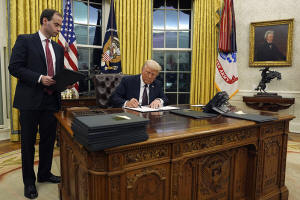Trump wants to pull the US out of the World Health Organization again.
Here's what may happen next
 Send a link to a friend
Send a link to a friend
 [January 21, 2025]
By MARIA CHENG and WILL WEISSERT [January 21, 2025]
By MARIA CHENG and WILL WEISSERT
WASHINGTON (AP) — President Donald Trump used one of the flurry of
executive actions that he issued on his first day back in the White
House to begin the process of withdrawing the U.S. from the World Health
Organization for the second time in less than five years — a move many
scientists fear could roll back decades-long gains made in fighting
infectious diseases like AIDS, malaria and tuberculosis.
Experts have also cautioned that withdrawing from the organization could
weaken the world’s defenses against dangerous new outbreaks capable of
triggering pandemics.
Here’s a look at what Trump’s decision means:
What happened?
During the first Oval Office appearance of his second term, Trump signed
an executive order detailing how the withdrawal process might begin.
“Ooh," Trump exclaimed as he was handed the action to sign. "That’s a
big one!”
His move calls for pausing the future transfer of U.S. government funds
to the organization, recalling and reassigning federal personnel and
contractors working with the WHO and calls on officials to “identify
credible and transparent United States and international partners to
assume necessary activities previously undertaken by” the organization.

This isn’t the first time Trump has tried to sever ties with WHO. In
July 2020, several months after WHO declared COVID-19 to be a pandemic
and as cases surged globally, Trump’s administration officially notified
U.N. Secretary-General Antonio Guterres that the U.S. was planning to
pull out of WHO, suspending funding to the agency.
President Joe Biden reversed Trump’s decision on his first day in office
in January 2021 — only to have Trump essentially revive it on his first
day back at the White House.
Dr. Tom Frieden, president and CEO of the advocacy group Resolve to Save
Lives, said Trump's move “makes Americans — and the world — less safe.”
“Withdrawing from WHO not only cuts crucial funding from the agency, but
it also surrenders our role as a global health leader and silences
America’s voice in critical decisions affecting global health security,”
Frieden said in a statement. “Real reform requires engagement, not
abandonment. We cannot make WHO more effective by walking away from it.
This decision weakens America’s influence and increases the risk of a
deadly pandemic.”
What is WHO and does this really matter?
It is the U.N.’s specialized health agency and is mandated to coordinate
the world’s response to global health threats, including outbreaks of
mpox, Ebola and polio. It also provides technical assistance to poorer
countries, helps distribute scarce vaccines, supplies and treatments and
sets guidelines for hundreds of health conditions, including mental
health and cancer.
“A U.S. withdrawal from WHO would make the world far less healthy and
safe,” said Lawrence Gostin, director of the WHO Collaborating Center on
Global Health Law at Georgetown University. He said in an email that
losing American resources would devastate WHO's global surveillance and
epidemic response efforts.
“It would make it more likely that we could see novel diseases spinning
out of control, crossing borders, and potentially sparking a pandemic,”
he said.

[to top of second column]
|

President Donald Trump signs an executive order withdrawing the U.S.
from the World Health Organization in the Oval Office of the White
House, Monday, Jan. 20, 2025, in Washington. (AP Photo/Evan Vucci)
 Can Trump really withdraw the US
from WHO?
Yes, as long as he gets the approval of Congress and the U.S. meets
its financial obligations to WHO for the current fiscal year. The
U.S. joined WHO via a 1948 joint resolution passed by both chambers
of Congress, which has subsequently been supported by all
administrations. The resolution requires the U.S. to provide a
one-year notice period should it decide to leave WHO.
What does this mean for WHO?
It’s extremely bad. The U.S. has historically been among WHO’s
biggest donors, providing the U.N. health agency not only with
hundreds of millions of dollars, but also hundreds of staffers with
specialized public health expertise.
In the last decade, the U.S. has given WHO about $160 million to
$815 million every year. WHO’s yearly budget is about $2 billion to
$3 billion. Losing U.S. funding could cripple numerous global health
initiatives, including the effort to eradicate polio, maternal and
child health programs, and research to identify new viral threats.
Numerous American agencies that work with WHO would also suffer,
including the U.S. Centers for Disease Control and Prevention and
the National Institutes of Health. Leaving WHO would exclude the
U.S. from WHO-coordinated initiatives, like determining the yearly
composition of flu vaccines and missions to countries battling
dangerous epidemics. American scientists would also lose quick
access to critical genetic databases run by WHO, which could stall
attempts to produce vaccines and medicines.
Why is Trump withdrawing the US from WHO?
At a September campaign rally, Trump said he would “take on the
corruption” at WHO and other public health institutions that he said
were “dominated” by corporate power and China. Trump has also said
that the U.S. contributed far more to WHO than China did and
complained that China “totally controls” the U.N. health agency.
“And now, they want to give control over our whole country to them,
which would be a terrible mistake," he said.

WHO typically issues advice to its member countries about how to
handle health crises, but the agency has no authority to compel
countries to act.
In 2020, Trump alleged WHO was “colluding” with China to hide the
extent of the coronavirus’ spread in the early days of the pandemic.
An AP investigation in June 2020 found that China withheld crucial
details about the virus shortly after it emerged, frustrating WHO’s
efforts to assess its potential for danger and stop its spread.
What has WHO said?
“We really believe in cooperation ... and from our side, we are
ready to work together,” said WHO Director-General Tedros Adhanom
Ghebreyesus at a December news conference. Tedros said the
relationship between WHO and the U.S. “has actually been a good
model of partnership,” saying he believed American leaders
understand the U.S. cannot be safe from health threats unless the
entire world is safe.
He noted that when Ebola struck a war-torn part of Congo in 2018, no
American first responders were involved. “It was WHO and partners
who help(ed) the (Congolese) government ... to contain that
outbreak.”
___
Cheng reported from London.
All contents © copyright 2025 Associated Press. All rights reserved |